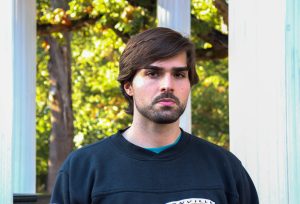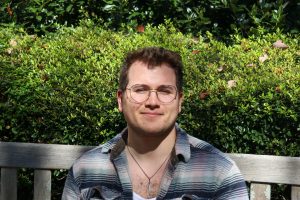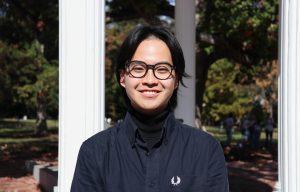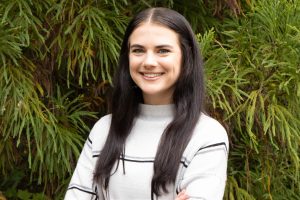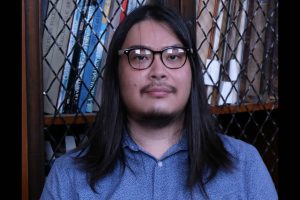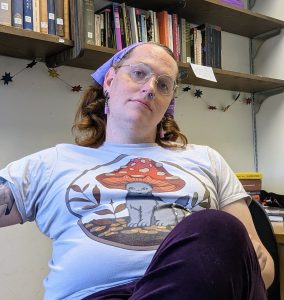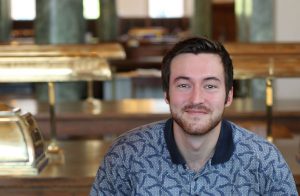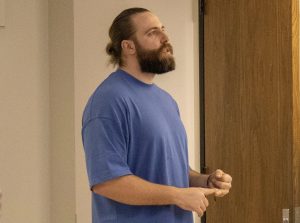Degrees
2016, MA English, Loughborough University
2014, BA English, Loughborough University
Bio
Doug Stark is a media and game studies scholar completing a Ph.D. in English at the University of North Carolina, Chapel Hill. At UNC, he works for the Digital Literacy and Communications Lab as the Game Research Coordinator and teaches courses on film, video games, comics, digital media, and writing. Primarily, Doug’s research concerns twentieth and twenty-first century forms of play and game, treating them as both expressions of contemporary social conditions and means of adapting to our technocultural environments. His dissertation – “Playing with Habit: The Biopolitics of Games Under Neoliberalism” – addresses the power games exercise over life by examining the habits they promote in colonial, military, managerial, and entertainment contexts. Find his forthcoming and published work in journals Extrapolation, Journal of Gaming & Virtual Worlds, Post-45, Eludamos, Qui Parle, Leonardo, and Configurations, and in edited collections Playing the Field, Encyclopedia of Video Games, and Depictions of Power.
Publications:
- Stark, Doug. “Exercises in Humility: Gregory Bateson on Contingency, Croquet, and Revising Habits of Thought Through Play.”Leonardo, 56 (1) 2023: 58-63.
- Stark, Doug. “Better Problems: Neoliberalism, Strategic Achronicity, and the Experimental Games To-Be-Made.” Qui Parle, 30 (2) 2021: 399-419.
- Stark, Doug. “Video Game Novels.” Encyclopedia of Video Games: The Culture, Technology and Art of Gaming, 2nd ed., edited by Mark J. P. Wolf, Greenwood Press, 2021: 1104-1107.
- Stark, Doug. “Training for the Military? Some Historical Considerations Towards a Media Philosophical Computer Game Philosophy.” Eludamos, 11 (1) 2021: 125–144.
- Stark, Doug and Teresa O’ Rourke. “The Lost Futures of BoJack and Diane.” Post45, special cluster “Leaving Hollywoo: Essays After BoJack Horseman,” 2020.
- Stark, Doug. “Unsettling Embodied Literacy in QWOP the Walking Simulator.” Journal of Gaming & Virtual Worlds, 12 (1) 2020: 49–67.
- Stark, Doug. “‘A More Realistic View:’ Reimagining Sympoietic Practice in Octavia Butler’s Parable Series.” Extrapolation, 61 (1-2), 2020: 151–171.
- Stark, Doug. “Ludic Literature: Ready Player One as Didactic Fiction for the Neoliberal Subject.” Playing the Field: Video Games and American Studies, ed. by S. Pöhlmann, De Gruyter, 2019: 153-173.
Awards
- Digital Dissertation Fellowship, Carolina Digital Humanities, UNC Chapel Hill, Spring 2023
- Institute of the Arts and Humanities (IAH) Grant, “Critical Game Studies Exchange,” Spring 2023
- Richard Brooke Scholarship, UNC Chapel Hill, 2022-2023
- The Bruns Essay Prize, Society for Literature, Science & the Arts, 2022
- Hobby Departmental Dissertation Fellowship, UNC Chapel Hill, Fall 2022
- IAH Grant, UNC/KCL “Media Aesthetics” Speaker Series and Working Group, Fall 2022, Spring 2023
- Game Studies Research Award, DLC lab, UNC Chapel Hill, Spring 2022, Fall 2022
- Collaborative Online International Learning (COIL) Fellow, UNC Chapel Hill, Spring 2022
- IAH Grant, UNC/KCL “Digital Aesthetics” Speaker Series, Fall 2021
- Games and Cultures Humanities Lab Fellow, Duke University, 2019-2020
- Santander Postgraduate Scholarship, Loughborough University, UK, 2014-2016
